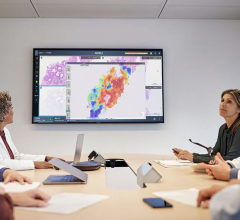
November 27, 2016 — Philips announced the introduction of Illumeo, a new imaging and informatics technology with adaptive intelligence that enhances how radiologists work with medical images. The intelligent software is the first, according to the company, to combine contextual awareness capabilities with advanced data analytics to augment the work of the radiologist. Its built-in intelligence records the radiologists' preferences and adapts the user interface to assist the clinician by offering tool sets and measurements driven by the understanding of the clinical context.
Illumeo aims to enable faster diagnoses, to drive well-informed care decisions and improved patient care. The new technology integrates with existing systems such as Philips IntelliSpace PACS (picture archiving and communication system) and will eventually extend its workspace efficiency beyond radiology to other domains.
The new Illumeo technology offers a radically new approach to how radiologists will see, seek and share clinical information, enabling them to provide an even more critical contribution to patient care. Through its Data Analytics Engine, the software provides the radiologist with the most relevant case-related information from various sources in one single view. This holistic 'Patient Briefing' includes the patient problem list (a work in progress and not currently available for sale in the U.S.), laboratory results, prior radiology reports, imaging orders or scanned documents (such as handwritten referral letters from general practitioners and referring specialists) obtained from health information systems like the electronic medical record (EMR) or radiology information systems (RIS). It integrates and organizes this data and helps radiologists to bridge the stages of diagnosis from treatment to follow-up, while being able to rely on a current, comprehensive patient picture.
"As the number of patients and complexity of care continues to increase, the amount of data and information we deal with on a daily basis is overwhelming," said Eliot Siegel, M.D., professor of diagnostic radiology for the University of Maryland Medical Center in Baltimore. "In order to help solve this problem, having solutions that streamline information and provide context to what is most relevant to a specific case is critical. This will provide a more efficient workflow, which is key to enabling quicker, more confident diagnoses."
Illumeo is also anatomy-aware. Built-in intelligence understands the anatomical context and thus what the radiologist is looking at on the screen. It then automatically suggests the right tool sets (such as tools for easy measurement and analysis of vessels) to help the radiologist focus on the diagnosis. Its intelligent clinical Semantic Labelling Engine reads and analyzes image tags and image series descriptions from a variety of vendors and provides automated semantic labeling with meaningful descriptions. It will make it easier and faster to retrieve specific, relevant medical images, and manage their display and quantification. Illumeo is adapting to and remembering radiologists' preferred hanging protocols: the complex process of organizing and displaying medical images for optimal examination, based on many variables such, modality, body part, available comparison images.
With Illumeo, the radiologist can also generate dynamic reports that can include 3-D images or image quantifications based on minimal user input. This information integrates with PACS and can be accessed via EMR systems. It can also be shared as a multidisciplinary patient information dashboard across the hospital enterprises to facilitate collaboration. The report is designed to be shared with colleagues or the referring physicians and supports the transition of radiology into a 'value-based' care delivery model.
The new technology will be showcased at the 2016 Radiological Society of North America (RSNA) Annual Meeting, taking place Nov. 27 – Dec. 2, in Chicago.
For more information: www.philips.com


 July 26, 2024
July 26, 2024 








